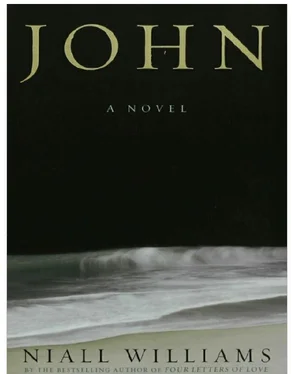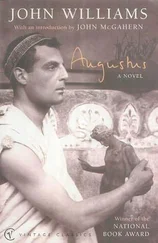They have sat for hours, John moving not the slightest. Prochorus himself is weary. When he is not active, heavy soft sponges of drowsiness descend on his brain. But he will not leave the old man; he will not sleep unless John does. And he decides that he cannot ask or disturb the Apostle in his meditation. Instead Prochorus blinks his eyes; he opens his mouth wide and hears his jawbone crack in its socket and holds a hand against it as if in admonishment. His head grows unbearably heavy. He feels it nod forwards as if in agreement and straightens himself and shakes it once to throw off the sleep that nests on stillness. He should get up and move about. He should put out the lamp perhaps. But he does neither. The sitting is intolerable prison now, but he cannot escape it. He considers it would be weakness and fault to move now. He must offer it. The old Apostle may be in communion such as he himself has never known. He it was, after all, who came upon John years earlier in their banishment, when the lightning had passed and the Apostle lay collapsed on the great stone. Prochorus had thought him struck by lightning in the temple of his head. His eyes were blind and he was speaking quickly, so quickly that at first it seemed he spoke in no language the scribe understood. Prochorus asked him if he had been out in the storm, if he been struck, for the rock was blackened. John did not answer but continued as if in tongues. His hand he reached on to Prochorus's shoulder, and the younger disciple led him to this cave nearby as their shelter. It was there, in the days and nights ahead, in fevered fits and starts, in long streams of words, and longer pauses, in a voice loud and strong and often angry — his hands flying out into the air about him, his blind face to the cave roof— that the Apostle dictated his revelation and Prochorus wrote it down.
It is the event of Prochorus's life. It is as close as he has come to the presence. Though years later he does not forget an instant of it. Not the hairs that stood on the back of his neck as he wrote, nor the chill in his blood, nor the sense he had as his stylus moved on the papyrus that the words would last the lifetime of the earth. He believed.
He knows it by heart. In the small hours of night, to keep awake now he mutely recites verses. Beside him, John is as before.
Some moonlight is uncovered by the wind-dragging clouds and falls at the entrance. Prochorus looks; he wonders what it might be to be visited just then by seraphim. Would he give his eyes for such? Would the dazzlement singe his brain? Although not an ancient, he is already an old man himself now. Perhaps there is nothing more for him. He wonders how each is chosen. How as if from a great constellation a hand sweeps through stars and selects one. He wonders at the destiny God has chosen for him, and if perhaps again, now, this bitter night, the Apostle will catch fire and speak.
'Let it descend' is his prayer. 'Let it come again, now, Lord.'
The wind whips up from the shore where Papias crouches to his knees over the stones. His head sings. His eyes blur with sudden tears. He feels struck in the pit of his stomach and retches violent, vacant gulps. The sea wind salts his face. From the corner of his mouth it pulls aslant a thin drool. He cries out a sound none hears. He stands upright and looks back at the widow Marina's dwelling, where the rough door opens and bangs with invisible traffic.
When he collects himself, Papias goes back inside. The scene is unchanged: the widow and the infants motionless upon her. The door opens and closes the light so she appears as in a series of identical portraits, each painted a grievous grey, each with a wild, implacable suffering.
'The children must be buried,' Papias says, softly. 'They are gone to the Lord.'
The widow shows no sign of understanding. Her eyes stare, as if across the room she keeps demons at bay.
Gently Papias leans down and places his hands on one of the children. The flesh is cold and scaled with something rough he cannot see. He goes to lift the child off the mother, and the moment the weight shifts she lets out a scream and grasps the infant to her.
'The children must be buried,' he says again. But the mother will not let go the child and shakes her head back and forth, and would be weeping if she had not wept herself away already, and so instead makes a kind of moaning crying and clings to the dead. Papias pleads with her. He tells her he will pray over the children. He tries to lift the first from her again, a girl it is, but the mother will not let go her hold. It is wretched and ugly and intolerable, and still the door bangs and opens and bangs and opens behind him in the wind.
'O Lord, help me,' Papias cries. 'Stop, stop, let go!' He wrenches the infant from her then, and then the other, and rushes outside into the ravaged light of day.
The girls are as nothing in his hands, weight of shells, no more. The lower side of one child's face and down her neck is spread a greenish scaling; the other wears it about her mouth like a lumpish paint. Papias looks up to the sky and wails. He holds the infant girls in the wind as if in offering, as if he believes that from the sky now will come a miracle. He draws down into the deep well of his faith and brings up this clear pure stuff that believes in the absolute bridge-way between man and God, that between earth and heaven is constant traffic of beseech and grant, that somewhere in all the lands stretching from Judea into Asia Minor, and even to Rome and Gaul beyond, there occur visits of the Divine, and the sick are sometimes restored. He holds the infant girls aloft in the wind. Ioseph has baptised all on the island, and will have dipped these children in the water; there is no fear for them. But still Papias finds himself asking. His faith tempts him to think of a personal favour. He looks at the girl with the ruined skin of her face and he closes his eyes. When he opens them, it will be gone; it will be cleansed away and he will feel the returning breath. Papias prays for it. He asks that it happen now. In a fever of belief he tells God that he will not succumb to vanity but keep the curing a secret. No one need know.
The wind beats at him. His eyes are shut to the dull grey hood of cloud, the obscured face of the heavens, but at any instant he expects to feel the blaze of illumination. His youth demands it, a visitation fierce and rapturous and violent.
Salt air swirls. Sandflies find the gash at his ankle and embed in blood. Gulls downed and raucous make urgent angry business with their wings. But Papias pays them no heed. The girls in his arms, his praying is absolute and aloud now. The Greek ascends into the air like a white ladder pressed up into the invisible, all about it the soft, exhausted collapse of the sea in the stones.
'Now, O Lord, come and make these, your children, live!' Papias cries. He tilts his head to allow the imminent radiance to blind him. That, he would gladly accept. Gladly he would be as the old apostle, his master. He has heard of so many healings, so many accounts of miracle, of leprosy cleansed, lameness righted, and even, yes, the dead rising, that he does not doubt the power; what he doubts is only his own worthiness to be its conductor.
The children lie along his arms, his hands cupping their heads. Across the sand floor unseen scuttles a crab. It delays on ochre seaweed, makes small pinchings of sideways motion; it is the size of a man's hand. What food it finds in the slime of the weed is insufficient, and it comes forward, pincers purposeful and elegant, across the shifting undulations of the sand. Minute twigs, like fingertips, the crab squeezes for small life. The blown bits of dwellings and boats from the sea, briny insect-loaded sea wrack, soft crumble harvests of rot alive with maggots, pieces of cloth run away in the wind, sheltering hard-skinned sea slugs, all that the storm undressed and shore-scattered like a bounteous god the crab considers on its route. In low observance it finds a plenitude and yet progresses onwards, as if a little of each is allowed only, or its lot is to be unrestful always on land. The crab crosses shingle and grit, finds brief meaningful pause in the under-place of a rock, scuttles on.
Читать дальше










